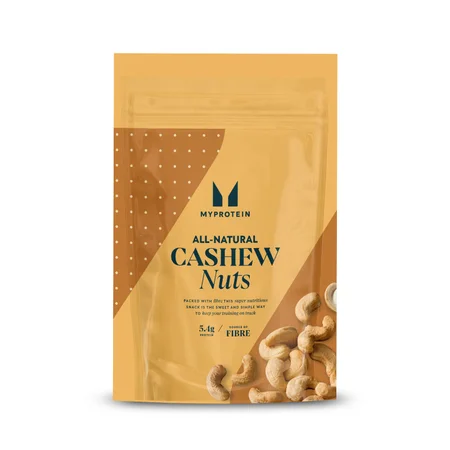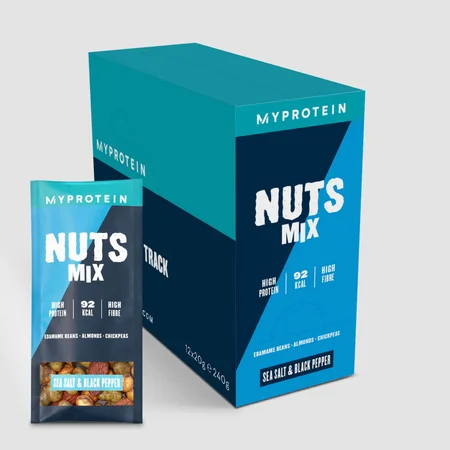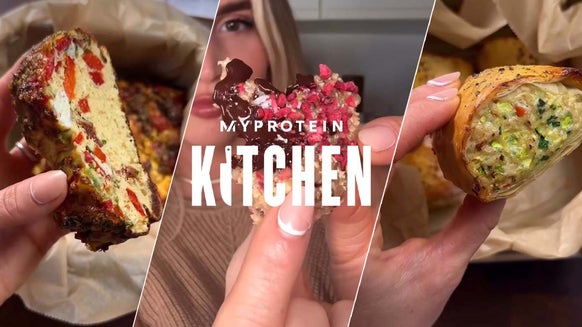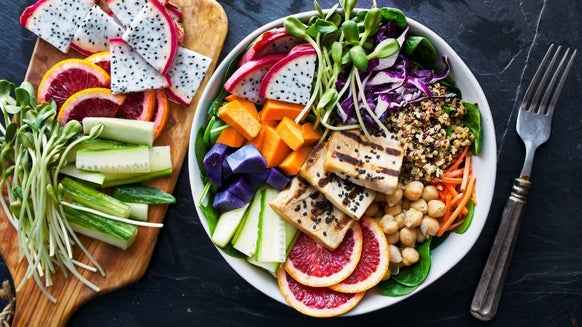
When you’re trying to lead a healthy lifestyle, your eating habits are the most important component - especially if you’re stuck at home in lockdown and have little else to do! To follow a healthy diet, it is important to keep your kitchen stocked with some essential items that you can combine in many ways to create well balanced meals.
Planning your meals ahead of time and following a strict shopping list can help you stay on track.
What Constitutes a Healthy Diet?
When we consider a healthy diet, there are more components than you might think. While we want to base our meals around lean proteins, whole grain carb sources, and fruits and vegetables, there are more factors to consider thanks to the most recent Dietary Guidelines.1
A variety of vegetables and fruits
Choose varied coloured vegetables (dark green, red and orange, starchy vegetables) and opt for whole fruits (berries, apples) over juice. Eating the whole fruit provides additional fibre and not just the sugary liquid that juice provides.
Aim for at least 3 servings of vegetables and 2 servings of fruit each day.
Calcium sources
Whether you choose dairy milk or alternatives (soy, rice, oat), make sure you get about 3 servings of high-calcium foods per day to protect your bones and teeth. If choosing dairy products, opt for low fat versions when possible. If you drink an alternative milk, check the label to make sure it provides calcium.
Protein foods
A variety of protein sources provides the best balance of nutrients and amino acids, but you can survive on all-animal sources or all-plant proteins, like beans, peas, and lentils. Try to limit fat and prepare protein foods in ways that don’t add fat, like baking or broiling instead of frying.
Between 5 and 8 ounces of protein is enough for the day, but you may need more based on your workout routine.
Fats
Choose heart-healthy oils over saturated fats, like olive oil instead of butter. Try to limit added fat when cooking foods, and select healthy fats for snacking like avocado, nuts, and seeds. Keep your saturated fat intake less than 10% of your total fat for the day.
Salt
Limit foods that are in high sodium by avoiding highly processed foods (think foods that can sit on the shelf forever - mostly junk food) and restaurant foods. Try to not add salt when cooking.
Added sugars
It can be hard to limit your sweet tooth, especially if you’re bored. Try to keep healthy options around, like small portions of dark chocolate or your favourite fruit (natural sugar) on hand for when you’re craving something sweet.
Alcohol
While 1 drink per day for women or 2 per day for men can be part of a healthy lifestyle, alcohol is calorie dense - it provides 7 calories per gram, which is more than carbs or protein (4 calories per gram) and closer to fat (9 calories per gram). It can lead to weight gain, so consider whether or not fitting alcohol into your plan is a priority.
How Regularly Should You Eat?
While there is not a one-size fits all plan for the timing of your meals and snacks, consider the eating patterns that work best for you based on your lifestyle, workout, and work schedule. If you’re following an intermittent fasting plan, you probably have the timing very structured.
If you’ve never followed a regular eating pattern before, adding some structure to your day can help limit overeating and excess snacking. Eating breakfast within a few hours of waking can kickstart your metabolism and prevent overeating later in the day.
Going more than 3 or 4 hours between large meals might require planning a healthy snack. While many people think eating before bed causes weight gain, the more important factor is your total calorie intake throughout the day. If you hit your calorie goals at dinner time, anything you eat later WILL lead to weight gain - simply from a positive calorie balance.
Plan your meals and snacks based on when you feel the hungriest and when you need to prep for or refuel from your workout. We’ll describe a plan that includes 3 meals and 2 snacks, but you can combine snacks for higher calorie meals or move them around based on your schedule.
Your Healthy 7-Day Diet Plan
Keep in mind that portion sizes vary based on your individual calorie and exercise goals.
Breakfast:
Old fashioned oats with a scoop of protein powder Berries Almonds
Morning Snack:
Apple slices Peanut butter
Lunch:
- Mixed greens salad
- Grilled chicken
- Yoghurt
Afternoon Snack:
Baby carrots Hummus
Dinner:
Strip steak with sweet potato and green beans
Breakfast:
Ancient grain toast with avocado and sliced tomato Orange slices
Morning Snack:
Hard boiled eggs and raisins
Lunch:
Black bean burger on whole grain bun
Afternoon Snack:
Banana and peanut butter
Dinner:
Chicken and vegetable stir fry with brown rice
Breakfast:
Banana-berry protein shake with one scoop protein powder, frozen banana, low fat milk, frozen berries, chia seeds
Morning Snack:
Whole grain crackers and string cheese
Lunch:
Low carb wrap with tuna salad and tomato
Afternoon Snack:
Mandarin oranges Edamame
Dinner:
Whole grain pasta with meat sauce and sauteed zucchini
Breakfast:
Whole grain tortilla with scrambled eggs, cheese, peppers and onions
Morning Snack:
Celery and peanut butter
Lunch:
Lettuce wraps with shrimp, cashews, coleslaw, and teriyaki sauce
Afternoon Snack:
Protein bar and cherries
Dinner:
Roasted salmon and broccoli Caesar salad
Breakfast:
Greek yogurt with low sugar granola and mango
Morning Snack:
Trail mix
Lunch:
Grilled chicken sandwich and side salad
Afternoon Snack:
Protein shake
Dinner:
Beef vegetable chili with baked tortilla chips
Breakfast:
Whole grain toast with almond butter and apple slices
Morning Snack:
Grapes and cottage cheese
Lunch:
Vegetable soup Crackers Strawberries
Afternoon Snack:
Grapefruit
Dinner:
Cauliflower-crust pizza Spinach salad with hard boiled egg and strawberries
Breakfast:
Two poached eggs over spinach, meatless sausage Fruit salad
Morning Snack:
Rice cakes with peanut butter
Lunch:
Quinoa topped with roasted veggies and cilantro dressing
Afternoon Snack:
Cucumbers and hummus
Dinner:
Baked chicken in tomato sauce with couscous
Take Home Message
READ THESE NEXT:

Claire is a Registered Dietitian through the Academy of Nutrition and Dietetics and a board-certified Health and Wellness Coach through the International Consortium for Health and Wellness Coaching. She has a Bachelor of Science in Biology and a Master’s degree in Clinical Dietetics and Nutrition from the University of Pittsburgh.
Talking and writing about food and fitness is at the heart of Claire’s ethos as she loves to use her experience to help others meet their health and wellness goals.
Claire is also a certified indoor cycling instructor and loves the mental and physical boost she gets from regular runs and yoga classes. When she’s not keeping fit herself, she’s cheering on her hometown’s sports teams in Pittsburgh, or cooking for her family in the kitchen.
Find out more about Claire’s experience here.
- U.S. Department of Health and Human Services and U.S. Department of Agriculture. 2015 – 2020 Dietary Guidelines for Americans. 8th Edition.






